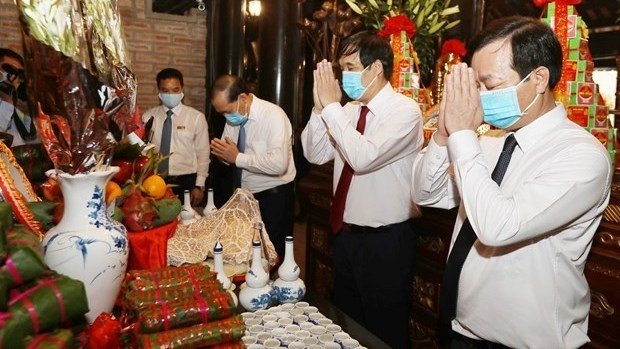
Authorities of the northern province of Phu Tho held a ceremony on March 29 to commemorate the legendary national ancestors of Vietnam, Father Lac Long Quan and Mother Au Co.

Officials of Phu Tho province pay tribute to Lac Long Quan at his temple on Sim Mountain on March 29 (Photo: VNA)
At the temples dedicated to Lac Long Quan and Au Co in the Hung Kings relic site, on behalf of the Vietnamese people, leaders of Phu Tho province offered incense and offerings to express gratitude to the two for laying the foundations of the country.
This year, due to impact of the COVID-19 pandemic, the ceremony was streamlined, and participants also took preventive measures as recommended by health agencies.
Meanwhile, many activities within this year’s annual festival of the Hung Kings’ Temple, which falls on April 2 (the 10th day of the third lunar month), will be cancelled due to the pandemic.
However, certain commemoration services will still be performed, including the incense offering ceremony – the most important ritual dedicated to the legendary founders of the nation.
Legend has it that Lac Long Quan married Au Co, who later gave birth to a pouch filled with one hundred eggs, which soon hatched into a hundred sons, believed to be the ancestors of the Vietnamese nation. Their eldest son was made king, who named the country Van Lang and set up the capital in Phong Chau (nowadays Viet Tri city of Phu Tho province), beginning the era of the Hung Kings.
To honour their great contributions, a complex of temples dedicated to them was built on Nghia Linh Mountain in Phu Tho, and the 10th day of the third lunar month was designated as the national commemorative anniversary for the kings.
The worship of the Hung Kings was recognised as part of the Intangible Cultural Heritage of Humanity by UNESCO in 2012.
With an increasingly vibrant and widespread emulation movement aimed at building cultured residential areas and cultured families, Yen Thuy District has been making steady progress toward improving both the material and spiritual well-being of its people, while fostering a civilized, prosperous, beautiful, and progressive community.
Once lacking recreational spaces and community facilities, Residential Group 2 in Quynh Lam Ward (Hoa Binh City) has recently received attention for the construction of a new, spacious, and fully equipped cultural house. The project followed the model of state support combined with public contributions in both labor and funding.
The "All people unite to build cultural life" movement, which has been effectively integrated with Kim Boi district’s socio-economic development goals, is fostering a lively spirit of emulation across local residential areas, hamlets, villages, public agencies, and enterprises. In addition, through the initiative, traditional cultural values are being preserved and promoted, while community solidarity and mutual support in poverty reduction and economic development are being strengthened.
A working delegation of the Hoa Binh provincial People’s Committee led by its Permanent Vice Chairman Nguyen Van Toan on June 11 inspected the progress of a project to build the Mo Muong Cultural Heritage Conservation Space linked to tourism services in Hop Phong commune, Cao Phong district.
Born and growing in the heroic land of Muong Dong, Dinh Thi Kieu Dung, a resident in Bo town of Kim Boi district, in her childhood was nurtured by the sweet lullabies of her grandmother and mother. These melodies deeply imprinted on her soul, becoming an inseparable part of her love for her ethnic group's culture. For over 20 years, this love for her hometown has driven Dung to research, collect, and pass down the cultural values of the Muong people to future generations.
In the final days of May, the Ethnic Art Troupe of Hoa Binh Province organized performances to serve the people in remote, mountainous, and particularly disadvantaged areas within the province. These were not just ordinary artistic shows, but they were the meaningful journeys aimed at spreading cultural values, enhancing the spiritual life of the people and contributing to the preservation of ethnic minority cultural identities.



